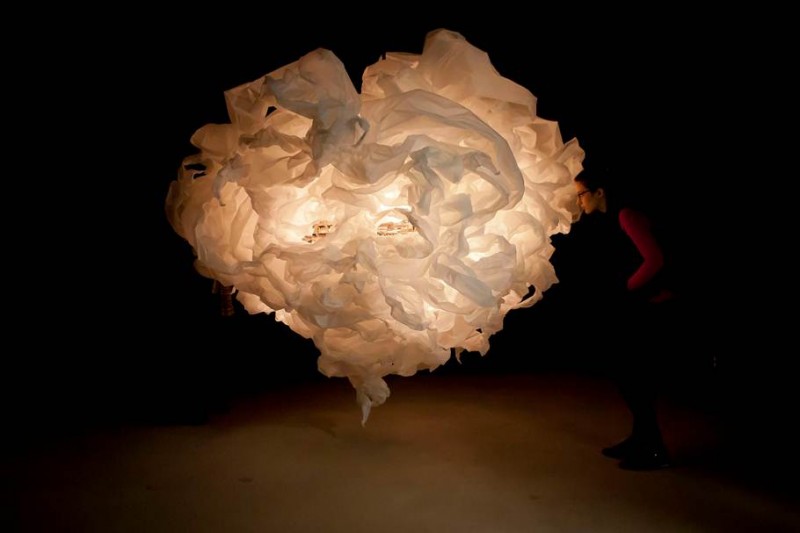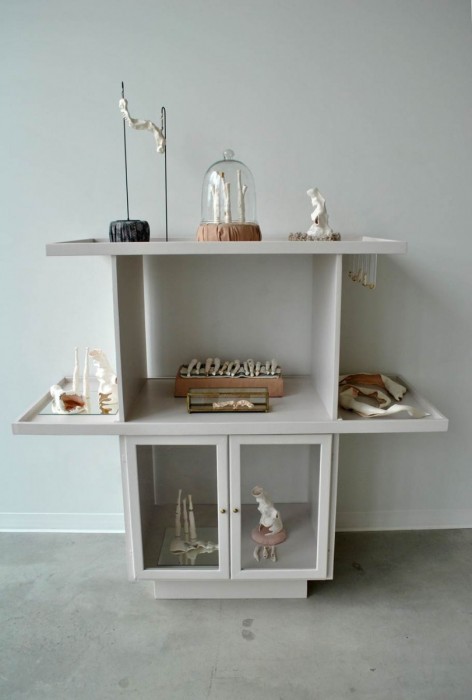Students win national art prize
Two University of Manitoba students won this year’s BMO Financial Group’s 1st Art! prize at the Invitational Student Art Competition.
Erika Dueck, who graduated from the School of Art in 2013, won the $10,000 National Prize for her sculpture The Ephemeral Mind. Hillary Smith, who also graduated from the School of Art this year, won the $5,000 Regional Prize with her work, Phrenological Petrifactions.
“It’s a huge honour to realize that others are responding and connecting to my work,” says Dueck. “As I worked on this project throughout the year, I was not sure how the piece would come together and whether people would engage with it. Winning this award is a confirmation for all of the moments I kept moving forward despite my doubts, confusion, and discouragements. I’m excited to be able to share the piece again as it exhibits in Toronto with the other regional winners and am so grateful that BMO has allowed me this opportunity.”
Her joyful sentiments are shared by Smith.
“I am so excited to have been chosen as the Manitoba winner,” Smith exclaimed. “Winning this prize helped in my realization that I can pursue a career as an artist and has pushed me to explore my work deeper and make bigger goals.”
This is not the first time a University of Manitoba student has claimed the prestigious national prize: In 2010 student Sherrie Rennie won with her work Inner-City “Bred”. And every year since 2005 a University of Manitoba School of Art student has won the Regional Prize.
How the artists describe their work:
Erika Dueck:
The mind is both organized and disorderly, linking thoughts and experiences unconnected within reality. It is unstable; memories are misplaced, sometimes forgotten, trapped in storage next to the illuminated, while others are never processed. This temporal structure is built up and destroyed within a lifetime, unique and never wholly accessible.
My inspiration came from my own childhood understandings of how memories functioned. I imagined that the mind resembled a large filing room that required recurrent visits in order to maintain information’s availability. If memories were placed in a room and not accessed often enough, an individual could potentially forget the existence of an entire room and its memories. In order to prevent this loss, I regularly practiced “memory cleaning” days throughout my life, systematically revisiting important “files” and allowing me to retain some memories from as young as two years old.
This piece is meant to be an impetus for viewers to further meditate and consider their minds and memories in relation to their understandings, their motivations, their fears, and their habits and question what they have remembered and forgotten, neglected, tried to forget, and what has become overwhelming, obsessive, and perhaps even relevant.
Hillary Smith:
In medicine there is a separation of the patient and their affliction. My work tries to connect the illnesses we suffer to the essences of our being, attempting to give feelings to parts of us that don’t normally feel emotion. I give our bones, organs, and entrails a voice and through my work they may tell us their otherwise silent stories. The objects I create imitate the human anatomy but have been dehumanized and embellished into beautifully delicate and petrified remains. They are the manifestations of perhaps the souls living within our bones and organs, the parts that are unseen when dissected.
The elements of construction in my work involve all things precious and fragile. Porcelain, bell jars, gold lustre, and cloth. The materials I use play a large role in the communication of our delicate state and the intricacies that lie under our skin.
Later in the year, more U of M students won more art prizes.








